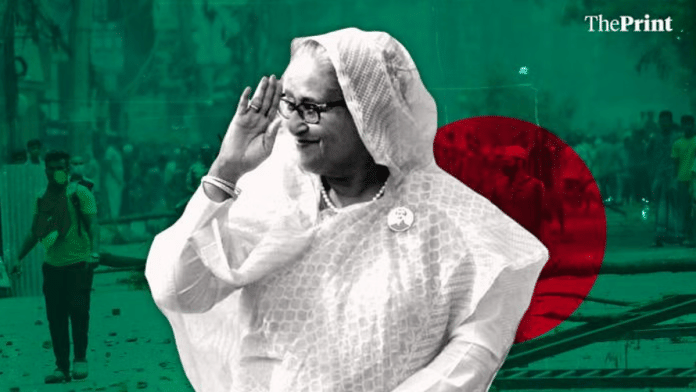On Monday, as Bangladesh reeled from two seismic shocks—a cascade of unprecedented earthquakes and the landmark verdict sentencing ousted Prime Minister Sheikh Hasina to death for command responsibility in last July’s uprising—Tarique Rahman, acting chairperson of the Bangladesh Nationalist Party, quietly shifted the national discourse with a single Facebook post.
From his verified account, followed by more than four million people, he urged the country to picture a modest garment factory owner in Gazipur, just outside Dhaka—a man who has spent years clawing out survival through grit and wafer-thin margins—suddenly watching the tariff protections that kept him afloat vanish overnight because of a so-called “development milestone.”
Rahman warned that the lives of countless ordinary Bangladeshis are about to be upended for the worse, all because a regime that ruled for more than 16 years through three manipulated elections made a far-reaching decision without public consultation and transparency.
The Hasina administration used questionable data and celebratory rhetoric to push Bangladesh’s 2026 graduation from Least Developed Country (LDC) status to “developing country”, trumpeting it as an epochal national accomplishment and a vindication of the Awami League’s governance.
But beneath the glossy triumphalism lies a harsher economic reality that the timing may be dangerously premature. The risks are structural and measurable.
Bangladesh’s export economy remains perilously concentrated in a single sector: Garments. Nearly 80 per cent of national export earnings are sewn in factories just like that one in Gazipur.
Graduating from LDC status means losing the preferential tariffs that make those exports viable. A sudden 10–12 per cent duty slapped onto Bangladeshi garments entering European markets would be a financial execution order.
And if we take a wider view, the vulnerabilities pile up: Dwindling foreign exchange reserves, a banking sector sagging under the weight of non-performing loans, rising external debt, and weak export diversification.
Also read: Don’t call student protests a revolution. It was a terror attack on Bangladesh: Sheikh Hasina
It’s all about optics
The timing could not be worse. Bangladesh is stepping into the harsher post-LDC reality just as the global trade environment is shifting into a period of protectionist friction, supply chain realignment, and green-standard regulation. It’s the wrong moment to lose trade privileges and concessionary financing.
Yes, graduating from LDC status is symbolically uplifting, a badge of dignity and development. Yes, it may enhance investor confidence, unlock new capital, and reinforce the narrative of a rising Bangladesh.
But this achievement is double-edged because the losses in tariff advantage and concessional loans are immediate. What makes this moment even more fraught is that the decision to press ahead with graduation is being accelerated by political calculation.
Under Sheikh Hasina’s leadership, graduation essentially became a political ornament, a tool for nationalist messaging rather than strategic planning. The government publicly declared that deferral was “impossible”, removing an option that other nations have successfully exercised.
Countries such as Angola and Samoa extended their timelines. The UN’s development policy explicitly allows flexibility in the face of economic vulnerabilities or external shocks. So why did Dhaka voluntarily shut that door?
The answer is painfully simple: Optics. The “dictatorial” Hasina administration preferred the performance of success over the management of risk. It treated graduation like a coronation, a proof that her stewardship had transformed Bangladesh into an economic contender.
It was meant to bolster legacy and legitimacy, even as the real-world preparedness for this transition lagged behind the glossy narrative.
This raises democratic questions as well as economic ones. Who gets to decide the timing of a structural shift that will shape the livelihoods of tens of millions? Who is accountable if the post-graduation shock slashes exports, closes factories, and strains the labour market?
Also read: Tarique Rahman was once the face of corruption. Now he could help save Bangladesh
Not a political trophy
The core of the criticism is essentially not anti-graduation; it is anti-haste. It is one thing to earn the right to graduate–Bangladesh has indeed done so. It is another thing to be economically ready to graduate–and that remains uncertain.
Bangladesh could have asked for a modest deferral–two to three years–buying crucial time to strengthen foreign reserves, stabilise banks, diversify exports, and renegotiate trade terms.
Instead, by proudly rejecting the option of delay, the Hasina regime walked willingly into a negotiation with weakened leverage and heightened risk.
Meanwhile, ordinary citizens were never shown the numbers. They were never asked whether they preferred delayed pride or immediate protection.
The truth however is that the milestone of LDC graduation is neither inherently good nor inherently bad. It can be transformative or destructive, depending entirely on readiness, sequencing, and honesty.
A confident nation asks hard questions–especially when the answers are inconvenient. Bangladesh has earned the dignity of development. But dignity also demands caution, transparency, and the discipline to ensure that progress is not merely symbolic.
If graduation becomes a political trophy rather than an economic strategy, the applause may fade quickly, while the consequences linger for a generation. Real national strength lies not in suppressing discussion, but in engaging it.
The people of Bangladesh have never been passive about their future. They ask for respect and a voice. And those who claim to govern in their name should remember that economic futures cannot be engineered by decree—they must be built through consensus and competence.
Faisal Mahmud is the Minister (Press) of Bangladesh High Commission in New Delhi. Views are personal.
(Edited by Theres Sudeep)







The Indian subcontinent is addicted to socialism. Hence, none of the countries here can achieve developed status.